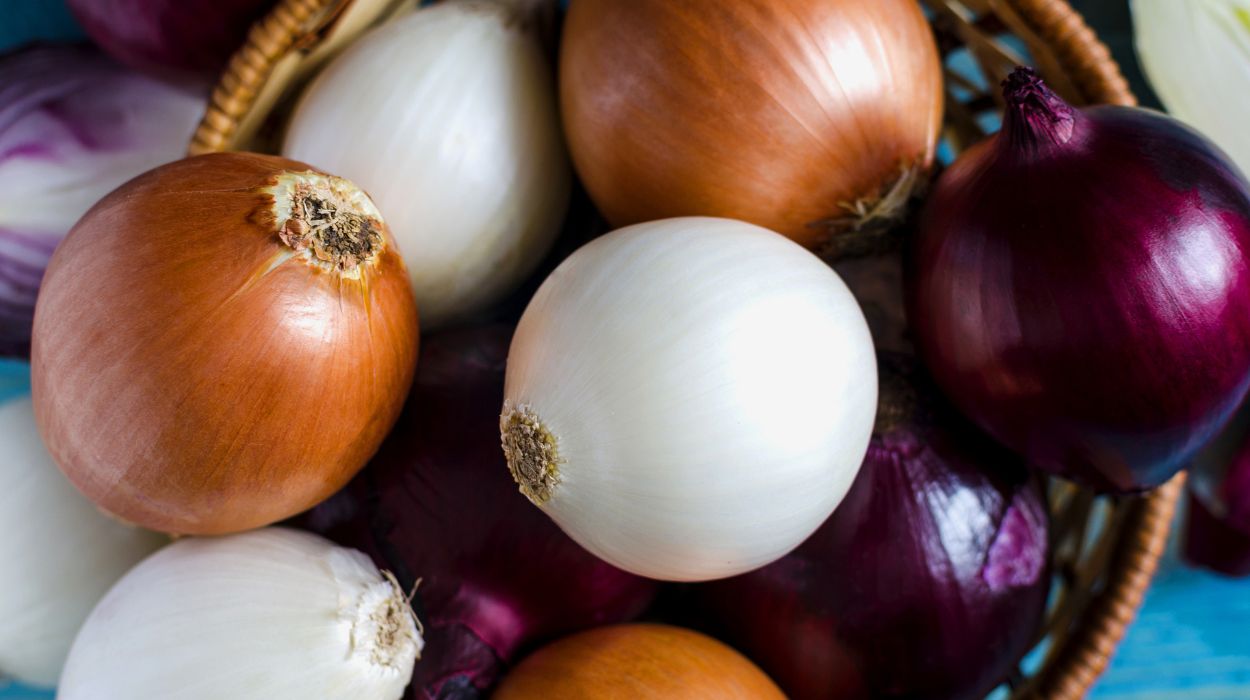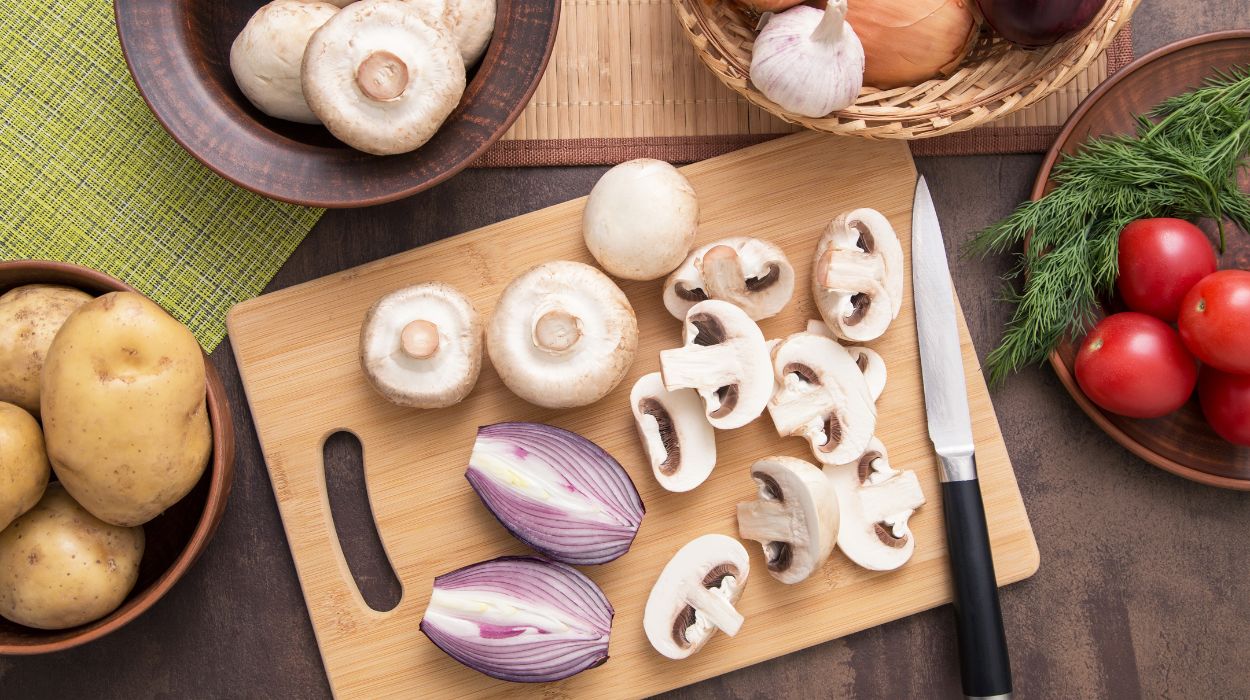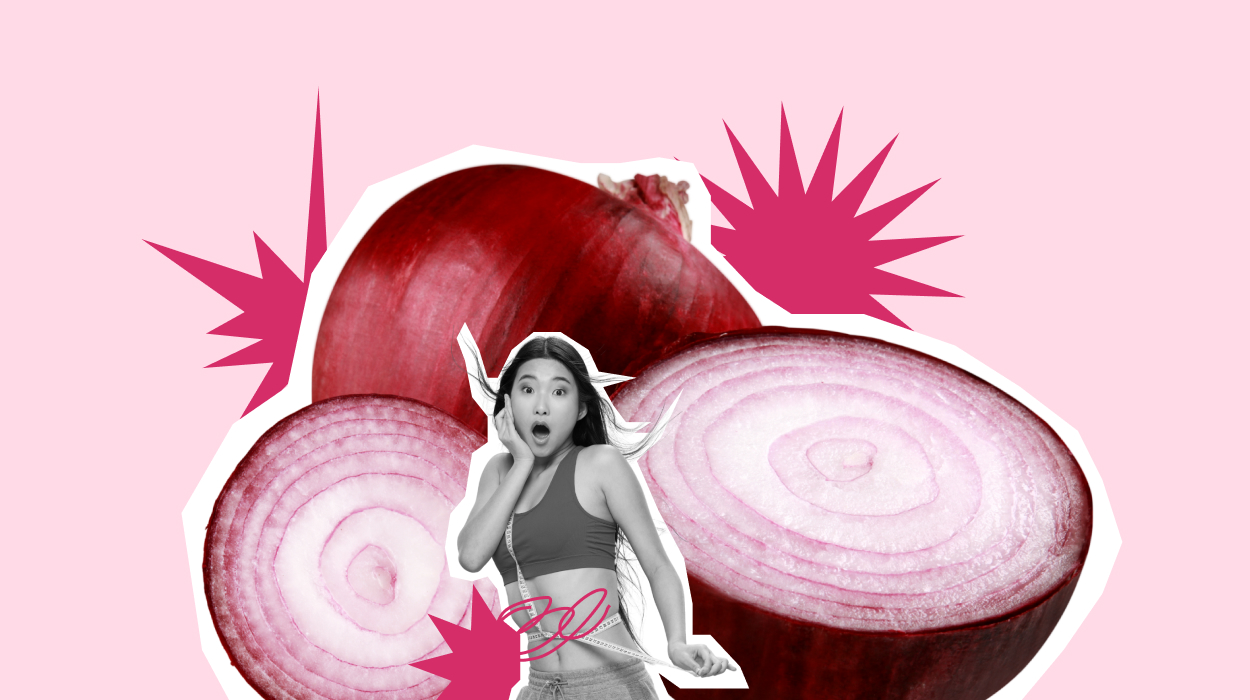The onion is considered a humble vegetable because it is budget-friendly and can be found worldwide. You may think they are just ingredients for recipes, but onions are plants that provide many essential nutrients.
Plants contain phytochemicals which are biologically active compounds that provide health benefits. Therefore, eating more plant-based foods such as fruits, vegetables, and beans, makes good health sense. Recent research asserts that bioactive compounds[1] are essential nutrients to improve overall health.
Nutritional components make onions a good addition to your diet, but are onions good for weight loss? Eating vegetables to support weight loss supplies you with essential nutrients plus they are low in calories. Low-calorie yet highly nutritious foods help you control your caloric intake, creating a calorie deficit, which is necessary for your weight loss goals. You must eat fewer calories than you burn to reduce body weight.
Let’s look further into the details about onions possibly supporting weight loss.
Can Eating Onions Speed Up Your Weight Loss Process?
Consuming onions provides essential nutrients and additional bioactive compounds that promote health benefits and support weight loss. Onions’ phytonutrients have antioxidant qualities that decrease the risks of chronic conditions such as cardiovascular disease, type 2 diabetes, and obesity.
Can Onions Be Beneficial For Weight Loss?

Onion, Allium cepa,[2] is a member of the Amaryllidaceae family and a relative of another sulfur-containing plant, garlic. Onions are packed with bioactive compounds that provide anti-inflammatory, antioxidant, antimicrobial, and anticancer[2] benefits. Scientific evidence demonstrates that onions may have anti-obesity properties[3] as well.
These benefits can be attributed to biologically active chemicals in onions known as phenolic compounds, specifically a high level of flavonoids. Onion peel contains a high amount of quercetin, a flavonoid demonstrating significant antioxidant qualities.[4] Quercetin is also being investigated for its preventative effects in metabolic disease[3] conditions such as high cholesterol and fat cell accumulation.
A systematic review and meta-analysis reported reduced body fat and weight[3] with the use of onion peel in several studies. A randomized controlled clinical trial involving steamed onions[5] demonstrated reduced cholesterol and total body fat, most notably visceral fat or abdominal fat. These findings are good news for people dealing with conditions such as obesity, heart disease, and type 2 diabetes.
The effects of dried onion powder containing quercetin on high-fat diet-fed mice were evaluated after 12 weeks. The results noted reduced cholesterol, blood sugar, and inflammatory markers plus decreased subcutaneous and visceral fat accumulation.[6] This study demonstrated improvements in multiple health markers associated with heart health.
Additional Potential Health Benefits Of Onions
Other health benefits include cardiovascular and metabolic protection as well as decreasing key disease markers for those conditions. Decreased cholesterol[3] and blood sugar in addition to regulation of fat metabolism are also positive effects observed from consuming onions.
Onions may also boost testosterone[7] levels. A study using male rats who consumed onion juice reported increased testosterone levels[7] and associated sexual behavior. This information may help develop future treatments for sexual dysfunction in men.
Reasons To Use Onion In A Weight Loss Diet
Adding onions to your diet supports your weight loss journey mainly due to an antioxidant called quercetin. Quercetin is associated with anti-inflammatory properties that improve your body’s response to oxidative stress – which may be caused by environmental factors, obesity, or a low-nutrition diet. Quercetin is also noted for its protective mechanisms[8] against cardiovascular disease, and metabolic diseases like type 2 diabetes, as well as obesity.
A successful weight loss plan can help manage these chronic conditions improving overall health and quality of life. Onions’ anti-obesity qualities such as reducing cholesterol and inhibiting fat accumulation may promote weight loss. Does onion burn belly fat?[5] As it turns out, research does demonstrate that the phytochemicals in onions can reduce stubborn belly fat.
The humble onion provides nutritional value including dietary fiber, carbohydrates, protein, sugar, and a small amount of fats. A medium-sized onion, or approximately one cup of chopped[9] onion contains 64 calories making it a low-calorie food. It provides vitamin C and several B vitamins and minerals.
One potential downside to eating onions is the occurrence of possible gastric reflux and feeling gassy or bloated. Onions contain certain sugars such as fructose that may harm your digestion if you are sensitive to FODMAPs[10] – fermentable oligosaccharides, disaccharides, monosaccharides, and polyols. These sugars are not absorbed well in the small intestine causing digestive upset for some.
Different Ways Of Using Onions For Weight Loss

Since onions have a low-calorie count they can help you create a calorie deficit to support weight loss. How can you effectively incorporate and use onions for weight loss?
Onion is a multi-purpose vegetable that can be used in many different ways. Recipes crafted across the globe use onions to add flavor and nutrients. Some familiar options may be to add them to recipes like tomato sauce, but what are some others?
- Sauteé onions in olive oil before adding them to recipes.
- Make French onion soup with vegetable broth.
- Add chopped onion to tacos.
- Mix raw onions into a green salad.
- Top a sandwich or black bean burger with sliced red onion.
- Caramelized onions are a tasty addition to a veggie wrap.
- Make salsa with red onions, tomatoes, cilantro, garlic, and lime juice.
- Marinate onions and garlic in olive oil, mash then spread over sourdough bread.
- Roasted veggies with onions, carrots, cauliflower, and broccoli.
- Pickled onions in vinegar can be used as a condiment.
Raw onion may provide more bioactive compounds versus cooked onion, but scientific evidence demonstrates that may depend on how onions are prepared.[11] Sauteeing seemed to keep the flavonoid content high, but other cooking methods altered its antioxidant capacity. Fresh-cut raw onion contains the highest level of phenolics and flavonoids.
Other Considerations For Weight Loss
When you want to lose weight it may seem like an uphill battle, but with all of the right tools you are more likely to succeed. Weight loss requires consistency, persistence, and patience, plus the proper information to attain your goals. Lifestyle changes are necessary for long-term weight management.
- Eating a low-calorie diet is essential to weight loss. Achieving a calorie deficit is a must to lose fat. However, your weight loss journey should involve a multi-faceted plan for the best results.
- Get the proper amount of physical activity. Experts recommend a minimum of 150 minutes per week[12] of moderate-intensity exercise including two days of resistance training.
- Eat more vegetables, fruits, beans, essential fats, and lean proteins for a healthy low-calorie diet.
- Get plenty of sleep[13] and manage your stress[14] levels to avoid possible weight gain.
- Avoid or limit low-quality processed foods.[15] Choose whole grains over refined grains.
- Drink water instead of sugar-sweetened beverages that increase calorie intake.
- Consider a dietary supplement for assistance to increase your nutrition level and intake of fruit and veggies.
Conclusion
Plants are composed of natural compounds that benefit human health in many aspects. Onions are one of the best vegetables for health and weight loss support. The humble onion is a low-cost, low-calorie phytochemical master in the veggie world.
Onions contain phenolics known as flavonoids and one of the most beneficial of these is quercetin. These compounds provide anti-inflammatory, antioxidant, and anti-obesity support for good health and weight loss. Research indicates onions’ properties offer protection from cardiovascular and metabolic diseases.
Onions are associated with reduced body weight, especially belly fat, plus lowering cholesterol and blood sugar. These improved health markers support a decreased risk for cardiometabolic diseases as well as aid your weight loss journey. Choosing to add onion to your diet is a winning choice to help you achieve your health and weight management goals.
Frequently Asked Questions
Recent research indicates that the phytochemicals in onions support weight loss, including reduced belly fat.
Eating onion daily is a good choice due to its health benefits and weight loss support. Raw onion contains higher antioxidant amounts than cooked but it depends on the cooking method.
Eating raw onion may be tolerable for most people, but some have difficulty digesting onion due to its fructose level.
Onion may upset digestion causing reflux or bloating for those who have an intolerance for fructose.
 Evidence Based
Evidence Based
